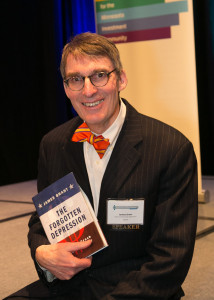Warren Buffet’s annual letters are usually packed with interesting insights, but for the past couple years I had been a little underwhelmed by his thoughts. This year’s letter was the exception. As I read the letter for the second time, I realized Buffet laid out exactly how an investor should construct an investment portfolio and evaluate businesses. Although investors won’t find actual recommendations, he delivers something more valuable: a framework for selecting and analyzing businesses that any serious investor can follow. If these lessons make sense to you, you will want to read the entire letter here.
It’s ironic that the lessons seem logical and obvious as he describes them, yet 90% of investors (both individual and institutional) will completely fail at following half of his advice. We can attribute that to attention spans of zero and the general get rich quick mentality. If investors can avoid those handicaps, this year’s letter was a real goldmine for investors who are looking for a sensible way to think about investing.
Although he gives his secrets away for free every year, implementation is always the hard part! I picked out a few of the best and most practical insights that you, the investor, need to follow. By shamelessly stealing Warren’s investment principles, you will be 95% of the way to an effective investment portfolio. Now, the lessons…
One: Businesses > Treasuries
Warren wasted no time describing the tremendous outperformance of U.S. businesses over US dollar denominated bonds over the past half century. As most investors flock to “safe” U.S. treasuries, Warren’s extols the impressive track record of owning American businesses over long time periods. The common perception that stocks are risky and bonds safe is completely discredited by the long term data. Of course, this is no absolute guarantee this will repeat in the future. But consider what you would rather own for the next 30 years: a sensibly priced business that can compound value at 10-15% per year or a 30 year treasury delivering 2.7%?
Investing should be thought of as buying businesses, not trading stocks. Buffet has slowly and methodically built his portfolio of great businesses without the manic-depressive emotions that occupy most investors. Your portfolio should be structured the same way. If you have the time and aptitude to evaluate businesses, wait until they go on sale, and then start building your portfolio.
Two: What Matters Most: Durable, Competitive Advantages
Buffet highlights one the best but most forgotten elements of investing. Warren and Charlie own businesses with durable competitive advantages that can compound value over time without needing excessive capital investment. Notice how he didn’t mention fast growth, growing market share, exciting technology, or world-changing products. He distills a great business into one line.
But how quickly do most investors forget what really matters! 99% of investing conversations revolve around superficial topics that are heavy in excitement but rarely touch on the elements of investment success. Do your investments satisfy this simple test? This idea is powerful because 1) it’s free and 2) most investors won’t use it! Resist the urge to fool yourself into thinking you can ignore this advice and “beat the market”. Your portfolio will thank you.
Three: Price Matters
Although Buffet expounds on the promise of great businesses, he doesn’t pay any price for them. Even Buffet admits that at close to 2x book value, Berkshire may likely see price declines in the near future. How refreshing to have a CEO give an honest assessment of the stock price! Not many CEO’s admit their companies are priced to perfection; in fact today most CEO’s are paying egregious prices for their own stock!
Great businesses still need to be bought at sensible prices! What is sensible is debatable, but if your business evaluation skills are sufficient it’s generally achievable to be roughly right on the price. Great businesses are not on sale very often, but it certainly happens. The key is buying with deployable cash to pounce on opportunities (The 2008-2010 timeframe being the last great opportunity).
Price is an area where most investors screw up. We are hardwired to buy high and sell low, and even the best businesses make poor investments when bought at the wrong times. Activity will be skewed toward inaction 90% of the time, but the other 10% will provide incredible opportunities to pick up wonderful businesses at bargain prices.
Bonus: Charlie Munger’s Thoughts
Followers of Berkshire know the wisdom of Charlie Munger. Charlie didn’t disappoint as he gave us a few pages of insight in this year’s letter. I’ll leave you with one piece of advice that applies to both investing and life. Here Charlie describes one of the many aspects of how Warren set up his system for Berkshire Hathaway:
“His first priority would be reservation of much time for quiet reading and thinking, particularly that which might advance his determined learning, no matter how old he became…”
What great advice for investors and people in general! Notice he didn’t mention checking stock prices, scheduling meetings, or email. Great investors and great ideas are not built from at frantic pace at which the market operates. The compounding of knowledge over time will pay some large dividends if you don’t interrupt the process!
There is a treasure trove of great advice from Warren and Charlie on the Internet. Let me know and I can directly point you to the best material out there.
—————————————
Adam Schwab is a portfolio manager at Elgethun Capital Management. Prior to joining Elgethun, Adam was a portfolio manager at the South Dakota Investment Council. He managed a $250 million large-cap global equity portfolio for 5 years and a $90 million SMID portfolio for 3 years. Adam is a CFA charterholder and a CPA. He has an MBA from the University of Chicago Booth School of Business and a degree in Finance from the University of South Dakota. He currently serves as a Trustee for the University of South Dakota and also serves on the boards of the Sioux Falls City Employee’s Pension Fund and Alta Trust. Outside of work, Adam has been married to his wife Sarah for 6 years. He is active in powerlifting, competitive taekwondo, and the outdoors.










